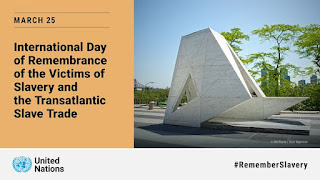Remembering Slavery: Countering Racism with Justice
“Now I've been free, I know what a dreadful condition slavery is. I have seen hundreds of escaped slaves, but I never saw one who was willing to go back and be a slave.”- Harriet Tubman.
It is estimated that over 15 million African women, men and children suffered the horror of enslavement and the trans-Atlantic slave trade. The transatlantic trade in enslaved Africans represents one of the most horrific and traumatizing eras in human history. The United Nations (UN) adds that this radicalized system of enslavement, abducted, trafficked, and brutally dehumanized Africans and their descendants over centuries, leaving a destructive legacy of racism grounded in the false narrative of white supremacy.
Countering Racism.
A critical way to counter racism with justice is to acknowledge the fundamental dignity, equality, and rights of people of African descent within communities, institutions, policies, laws and governing bodies. The United Nations in recognizing the egregious history and legacies of enslavement will increase efforts to address racism, intolerance, bigotry and hatred, to advance the cause of global freedom. Many of us find it extremely challenging to watch movies that depict slavery. In as much as these Hollywood movies try to capture slavery and the experiences of the enslaved Africans none of these movies can ever capture the extent of the transatlantic slave trade. As a result, the global community pauses annually on March 25th in observance of the International Day of Remembrance of the Victims of Slavery and the Transatlantic Slave Trade.
The day is set aside to raise awareness of the history of the transatlantic slave trade, its impact on the modern world, and its legacies, including racism and prejudice. We must never forget those who suffered and resisted oppression. Unfortunately, the fight against racial oppression and other forms of discriminatory practices continue. The global advocacy for equality and justice should continue with unwavering commitment in order to dismantle all forms of slavery. This year’s theme is "Creating Global Freedom: Countering Racism with Justice in Societies and Among Nations". It is vital that some contextual background be shared concerning the transatlantic slave trade.
Transatlantic Slave Trade.
The transatlantic slave trade was an oceanic trade in African men, women, and children which lasted from the mid-sixteenth century until the 1860s. European traders loaded African captives at dozens of points on the African coast, from Senegambia to Angola and round the Cape to Mozambique. The great majority of captives were collected from West and Central Africa and from Angola. The trade was initiated by the Portuguese and Spanish especially after the settlement of sugar plantations in the Americas. European planters spread sugar, cultivated by enslaved Africans on plantations in Brazil, and later Barbados, throughout the Caribbean. In time, planters sought to grow other profitable crops, such as tobacco, rice, coffee, cocoa, and cotton, with European indentured laborers as well as African and Indian slave laborers. Nearly 70 percent of all African laborers in the Americas worked on plantations that grew sugar cane and produced sugar, rum, molasses, and other byproducts for export to Europe, North America, and elsewhere in the Atlantic world. Those of us who are descendants of enslaved Africans must never forget that much of the wealth generated by the transatlantic slave trade supported the creation of industries and institutions in modern North America and Europe. The transatlantic slave trade was a transfer of wealth as much as it was the dehumanizing of one race by another.
The Way Forward.
On this International Day of Remembrance of the Victims of Slavery and the Transatlantic Slave Trade let us as descendants of enslaved Africans remember the horror as well as the resilience our ancestors experienced. The sheer brutality experienced by the enslaved Africans speaks to the evil that mankind is capable of. In honouring their memories we must stand up for human rights and justice. In honouring their memories we must get involved in advocacy at our community levels in order to educate our people of their history. It is also important that we realize that our history did not begin with the transatlantic slave trade. It is also critical that we lend our voices to ask that history education becomes compulsory for all grades throughout the secondary level of the education system.
In the words of the United Nations Secretary General, António Guterres, today, and every day, we reject the legacy of this horrific crime against humanity. We call for reparatory justice frameworks, to help overcome generations of exclusion and discrimination. We appeal for the space and necessary conditions for healing, repair and justice. And above all, we resolve to work for a world free from racism, discrimination, bigotry and hate. Together, as we remember the victims of the Transatlantic Slave Trade, let’s unite for human rights, dignity and opportunity.
Wayne Campbell is an educator and social commentator with an interest in development policies as they affect culture and or gender issues.
waykam@yahoo.com
©
#RememberSlavery



Comments
Post a Comment